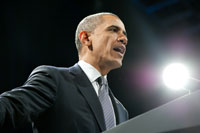
Governments, including those that are democratically elected, often display a propensity and determination to act contrary to their self-interest. The quagmire in which the US administration finds itself on Syria is, to a large extent, of its own making. It is unlikely that anything President Barack Obama heard at the G-20 summit or since then will discourage him from ordering surgical military strikes against Syria. Only the US Congress can provide the required discouragement.
The fact that Bashar al-Assad has used brutal force to maintain his repressive regime is not in any doubt. Equally, the situation today is largely due to the pursuit of regime change by the Gulf states and Turkey supported by the US, UK and France. The rebels fighting the regime, all Sunnis armed to the teeth by Saudi Arabia, Qatar, Turkey and their Western allies, are affiliated either directly or indirectly to al-Qaeda and are engaged in a sectarian war against the Alawites or Shias and Christians. Violence unleashed by them has matched the brutality of regime forces.
The use of chemical weapons is immoral and unacceptable, and must be condemned. Given the nature of the conflict, jumping to conclusions before all the evidence has been analyzed, and conclusively holds one party responsible, is fraught with additional danger. Apart from placing the military might of the US at the disposal of al-Qaeda, military strikes, which appear increasingly likely, will result in another paradoxical situation. Deaths from chemical weapons constitute less than 1 per cent of fatalities since the Syrian civil war began more than two years ago.
Limited enthusiasm for military strikes against Syria is the least of the problems confronting decision-makers in Washington. A concerted campaign to convince the skeptics, both within Congress and outside, may rectify the situation. The more serious implications that need to be factored in include the near certainty that such strikes will strengthen the very forces that constitute a threat to the US’s national security.
Prior to and after 9/11, al-Qaeda was largely an unseen force with considerable outreach that could deploy its assets for carrying out terrorist strikes, but without an ability to hold territory. This slowly began to change with al-Qaeda and its affiliates entering the business of holding and administering territories in parts of Yemen and Somalia.
Post military-strike scenarios in Syria are frightening from almost every angle, including from the vantage point of US national security. Consider for a moment a scenario that results in the overthrow of Assad. Military interventions invariably have unintended consequences which, even if they can be anticipated, are ignored till it is too late. In the absence of security guarantees for the Alawite and Christian segment of the population, it is almost certain a bloodbath would ensue, opening up sectarian faultlines in other parts of the region.
The ouster of Assad would almost certainly usher in even more chaos and instability which, consequently, could pose a danger to stability in the Arab-Israeli context. Given the ferment in Egypt, where the removal of the elected Muslim Brotherhood in a military coup could produce a more radical Salafist dispensation, the unraveling of Syria could result in unimaginable consequences not only for the Middle East, but for the rest of the world. There is no moderate opposition in Syria that can be relied upon to build a secular and liberal democracy that respects the rights of all sections of society.
There is, of course, the possibility that military strikes could be calibrated and surgical and not aim at Assad’s ouster but constitute just enough of a punitive action to teach him a lesson not to use chemical weapons in future. Such a scenario, though entirely feasible in terms of military logistics, is predicated on the absurd assumption that none of the other stakeholders in the conflict would take action.
There is both a history of use of chemical weapons and manipulation of evidence in the past in Iraq, and more recently in Syria. Setting red lines regarding their use is, therefore, anchored in morality and not realpolitik. Those who make the argument do so with the force of moral conviction that the use of chemical agents is immoral and banned, and to allow their use to go unpunished would significantly lower the threshold for their use.
Another scenario, not entirely improbable, is that if the August 21 use of chemical weapons indeed emanated from the Assad regime, the order may have come from rogue elements therein. In the absence of conclusive proof as to who ordered their use, military action that punishes the entire country, already subjected to large-scale devastation, would be unjustified, disproportionate and illegal.
International markets have not yet fully factored in the prospect of military action in Syria on the price of oil. Both China and Russia have cautioned the US against military action. The Obama administration cannot afford to entirely disregard their views because, between them, they reportedly hold 25 per cent of all foreign-held debt in the US.
President Obama is scheduled to make a forceful case for military action in Syria today. There is no ambiguity insofar as international law is concerned. Military action can be undertaken only in self-defense, or with the explicit authorization of the UN Security Council. Given the council’s experience on Resolution 1973 authorizing the use of force in Libya, it is almost inconceivable that the Chinese and Russians will agree.
Hardeep S. Puri was India’s permanent representative to the UN and is a senior adviser at the International Peace Institute. A version of this article was also published in the Indian Express.
About the photo: Barack Obama in Chicago, January 11, 2012. (Christopher Dilts/Obama for America)




